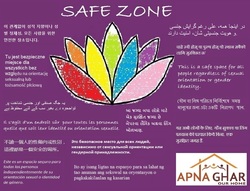|
by: Naomi Anurag Lahiri  This image is a safe zone sign I made specifically for Apna Ghar when I first started working at the shelter. As a new Apna Ghar advocate, I was excited to find that our agency was staffed by people who treat queer1 and trans2 clients with thoughtful sensitivity and respect. I wanted to make this more overtly visible to clients, so I made a sign. The rainbow represents the LGBTQ community, the lotus flower is often used in a South Asian context and the purple is the color for domestic violence awareness. Advocating for cultural competency in regards to both trans, queer and desi3populations is something I have been dedicated to for years. However, it was only until working at Apna Ghar that I have felt I’m able to do all at the same time. On July 4-6thI attended DesiQ, an international conference held by Trikone in San Francisco and Oakland for trans and queer South Asians. This conference doesn’t happen more than every 5 years so I felt privileged to be able to attend at this point in my life. I gained a lot of knowledge to bring back to my Chicago community and Apna Ghar. During workshops, the open-mic night, and performances during the Gala, I witnessed the stories of abuse and trauma that other community-members, younger and older, carried with them. These realizations and stories were difficult and painful, but necessary. The abuse that desi parents, friends, community members and strangers perpetrate towards trans and queer desis is often normalized. It is simply expected that trans and queer desis will experience emotional, physical and/or verbal abuse regarding their gender identity, gender presentation, or their sexuality. I was reminded to not be a bystander to other people’s issues of depression, suicidality and substance abuse that are still prevalent in the community. While I was vocal about these things a few years ago, with time and experience I just started to accept these things as a reality. I know it is not acceptable for me, as a social worker and activist, to be quiet and let these issues get pushed under the rug. I am now feeling grounded and inspired to bring this renewed energy to my work at Apna Ghar and in the community. I find it extremely meaningful that culturally sensitive agencies like Apna Ghar, as well as individuals, can make our needs heard. At this conference I was made aware of new (to me) ways we can be transformative4 in our justice-seeking and healing in every space we inhabit. For example, not every experience at the conference was healing for all attendees and not every workshop or event was on point, politically and socially. However, I feel that we came together and addressed these issues in an inspiringly transformative way during our community check-ins. During the check-ins, conference attendees shared their feelings, concerns and experiences, and some ideas on how to move forward as a community. We came together to address that transphobia and rape jokes should not be permitted in our spaces as they are meant to be safe, healing and nurturing. Upon reflection, I saw parallels and how we can continue trying these different methods of community-building and support at Apna Ghar, especially the shelter. I hope to be more mindful of these approaches in my own work at Apna Ghar. On the topic of transformative justice, I was pleased and surprised by the workshop on violence in the South Asian community by Tina Oza and Preeti Mangala Shekar. This was not a basic presentation about violence in the South Asian community. We got to discuss the barriers and limitations we face in the social service industry, as well as the innovative ways we can overcome some of them. Attendees shared their ideas and experiences addressing violence in the community. With survivors facing barriers like fearing being outed by the abuser, or being deported if they approach the legal system, we discussed the possible ways we can hold abusers accountable without involving outsiders and the systems that were not designed to protect these survivors. One example that someone gave was a situation where a community agreed to provide a safe space for the victim by notifying the abuser that he could not attend their events or be present in their spaces. These learning moments continued as the weekend went on. After the DesiQ conference wrapped up, a group of us got together in Berkeley to train to be call-takers for the DeQH (South Asian LGBTQ) helpline. People call this helpline with issues of isolation, violence, depression, suicidality, and many, many others. Just like I feel so privileged to have had the opportunity to give back for a year and a half at Apna Ghar, I am also thankful that I am able to use my skills and experience to take calls and give back in this way. 1 = a reclaimed term used by and for sexual and gender minorities. 2 = this term attempts to cover identities including but not limited to androgyne, agender, bakla, bigender, genderqueer, hijra, kathoey, kothi, non-binary, third gender, transgender, transsexual, and two spirit. 3 = a term used by people from South Asia and the South Asian diaspora. 4 = transformative justice is a way of addressing crime within a community, beyond the legal system. This process involves communication and collaboration between the victim
1 Comment
|
CONTACT US
4350 NORTH BROADWAY, 2ND FLOOR, CHICAGO IL 60613
MAIN: 773 883 4663 | SKOKIE: 847 983 4099 | SOUTHSIDE: 773 697 3272
Email: [email protected]
APNAGHAR.ORG | @APNAGHARINC
24-HOUR CRISIS SUPPORT
Phone: (773) 334 4663 | Text: (773) 899 1041 | Email: [email protected]
MAIN: 773 883 4663 | SKOKIE: 847 983 4099 | SOUTHSIDE: 773 697 3272
Email: [email protected]
APNAGHAR.ORG | @APNAGHARINC
24-HOUR CRISIS SUPPORT
Phone: (773) 334 4663 | Text: (773) 899 1041 | Email: [email protected]
Together we can end gender violence
Copyright © 2020 Apna Ghar, Inc.

 RSS Feed
RSS Feed